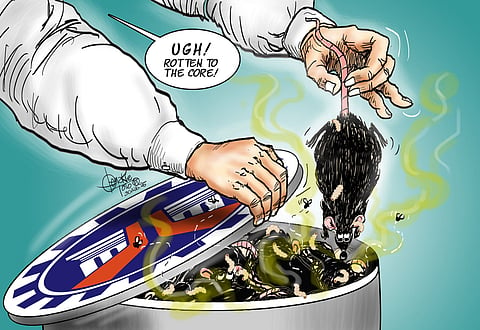
- NEWS
- the EDIT
- COMMENTARY
- BUSINESS
- LIFE
- SHOW
- ACTION
- GLOBAL GOALS
- SNAPS
- DYARYO TIRADA
- MORE

President Ferdinand Marcos Jr. has made a show of naming and shaming those behind the “ghost” flood control projects — paper dikes and phantom river walls that cost taxpayers billions yet delivered nothing but more floods.
From the stage of his State of the Nation Address in July to televised inspections of nonexistent structures in Bulacan, the President has wielded exposure as his weapon of choice. But shame, however loudly broadcast, will not drain the corruption out of a bureaucracy that has normalized it.
The P55.7-million Baliwag river wall, declared completed and fully paid, yet absent on the ground, is not an anomaly. It is emblematic of an entrenched system in the Department of Public Works and Highways (DPWH) where thousands of projects have been padded, duplicated, or fabricated outright.
Over 6,000 contracts with vague scopes, coupled with 15 favored firms cornering an outsized share of deals, reveal what Senator Ping Lacson described as a “mafia playground.” Local officials in Pampanga have likewise alleged over a billion pesos in dubious works. This is not mischief by a few rogue engineers — it is institutional rot.
The President’s lame show to publicize the large-scale fraud may score headlines, but it offers little deterrence. Contractors and officials implicated in the ghost projects are not moved by shame; they operate with impunity, protected by political patrons and shielded by layers of paperwork. For them, exposure is a temporary storm to be weathered until the cameras leave. What would matter is the certainty of punishment — indictments, convictions, asset seizures — not another presidential scolding.
That certainty has been absent, and the responsibility for this absence rests squarely on DPWH Secretary Manuel Bonoan’s shoulders. In Senate hearings, Bonoan admitted he was aware of the questionable projects. By his own words, the secretary cannot plead ignorance. Yet despite years at the helm, he has failed to institute mechanisms as basic as mandatory geotagging, third-party validation, and rigorous blacklisting of defaulting contractors. His stewardship has allowed the atomization of thousands of small contracts — ripraps, slope protections, culverts — perfect vehicles for rent-seeking and ghosting.
Command responsibility is not a ceremonial phrase. If ghost projects had flourished under his watch, and he admitted to knowledge of them, then Bonoan must go. Firing the secretary will not, in itself, cleanse the DPWH, but it will at least affirm that accountability in government begins at the top, not at the district engineer level. Retaining him signals the opposite — that failure has no cost, and that “shaming” subordinates is enough to excuse leadership.
The stakes could not be higher. Billions are being siphoned off while the country faces ever-worsening floods. Each peso lost to phantom projects is a river channel left unbuilt, a dike left unfinished, a community left to drown. Public trust is corroded further each time Malacañang unveils anomalies but stops short of holding its own men to account.
The President has vetoed questionable line items and vowed to publish a full project list. These are steps in the right direction, but they skirt the fundamental truth: the DPWH has failed in its core duty to ensure public works exist in reality, not just in reports. If Marcos is serious about reform, he must demonstrate that accountability cuts through his own Cabinet and the cabal of thieving lawmakers responsible for funding the ghost or substandard projects.
Expose the rot, yes. Prosecute the guilty, absolutely. But do not mistake public shaming for justice. The nation does not need another spectacle of outrage; it needs a housecleaning that begins with the dismissal of the DPWH secretary.
Only then can Filipinos believe that the government intends to build real defenses against floods, instead of paper walls against criticism.
